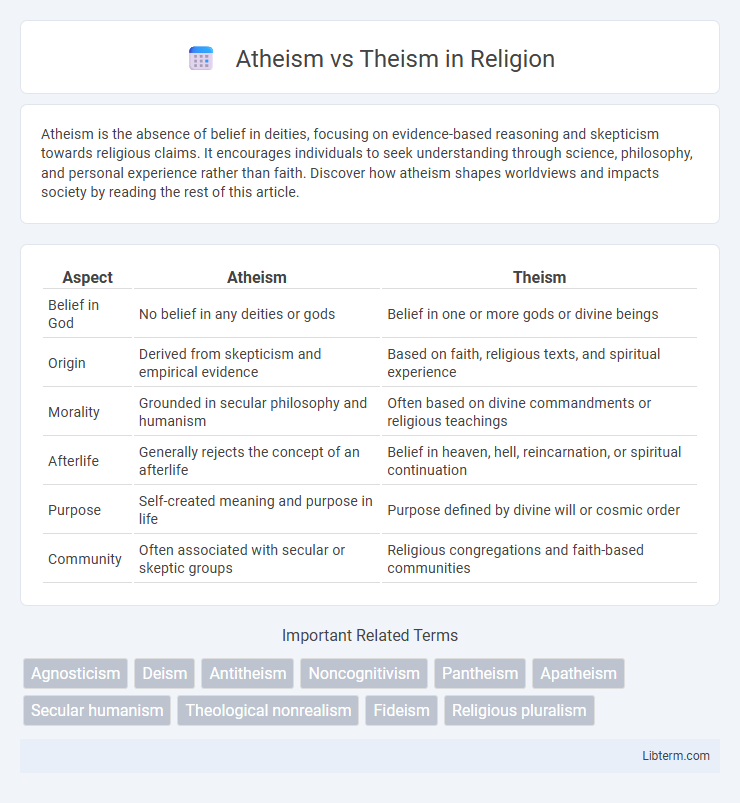Atheism is the absence of belief in deities, focusing on evidence-based reasoning and skepticism towards religious claims. It encourages individuals to seek understanding through science, philosophy, and personal experience rather than faith. Discover how atheism shapes worldviews and impacts society by reading the rest of this article.
Table of Comparison
| Aspect | Atheism | Theism |
|---|---|---|
| Belief in God | No belief in any deities or gods | Belief in one or more gods or divine beings |
| Origin | Derived from skepticism and empirical evidence | Based on faith, religious texts, and spiritual experience |
| Morality | Grounded in secular philosophy and humanism | Often based on divine commandments or religious teachings |
| Afterlife | Generally rejects the concept of an afterlife | Belief in heaven, hell, reincarnation, or spiritual continuation |
| Purpose | Self-created meaning and purpose in life | Purpose defined by divine will or cosmic order |
| Community | Often associated with secular or skeptic groups | Religious congregations and faith-based communities |
Defining Atheism and Theism
Atheism is defined as the absence of belief in deities, often emphasizing a reliance on empirical evidence and scientific reasoning to explain the universe. Theism, by contrast, involves belief in one or more gods, typically grounded in religious traditions, faith, and spiritual experiences. Both positions represent fundamental perspectives on the existence of divine beings and influence diverse philosophical, moral, and cultural worldviews.
Historical Origins and Evolution
Atheism and theism have distinct historical origins, with theism rooted in early human civilizations' belief in supernatural deities, evident in ancient Mesopotamian, Egyptian, and Indus Valley religions around 3000 BCE. Atheism emerged later as a formal philosophical stance, notably during the classical era with figures like Epicurus in ancient Greece challenging divine intervention. Over centuries, the evolution of atheism and theism reflects shifting cultural, scientific, and intellectual developments, including the Enlightenment's emphasis on reason and secularism that significantly influenced modern secular thought and religious belief systems.
Key Philosophical Arguments
Atheism challenges the existence of deities by emphasizing empirical evidence and the problem of evil, arguing that the lack of observable proof undermines belief in God. Theism asserts that reason, moral order, and existential purpose point toward a divine creator, often invoking ontological and cosmological arguments as rational foundations. Both perspectives engage deeply with questions about the nature of existence, causality, and the source of meaning in human life.
Scientific Perspectives and Worldviews
Scientific perspectives on atheism and theism often highlight empirical evidence and natural explanations as foundational to atheism, which relies on skepticism and the scientific method to understand the universe. Theism typically incorporates metaphysical beliefs and divine causality, which science neither proves nor disproves but treats as outside its empirical scope. These contrasting worldviews influence interpretations of cosmology, evolution, and consciousness, shaping diverse approaches to knowledge and existential meaning.
Moral and Ethical Implications
Atheism grounds moral and ethical frameworks in secular humanism and rational inquiry, emphasizing personal responsibility and societal well-being without reliance on divine command. Theism often bases ethics on religious doctrine, linking morality to adherence to divine laws and the pursuit of spiritual virtues as defined by sacred texts. These differing foundations influence debates on moral absolutism versus relativism, shaping perspectives on justice, human rights, and the source of moral authority.
Social and Cultural Impact
Atheism influences social structures by promoting secularism, scientific reasoning, and individualism, often challenging traditional religious norms and institutions. Theism shapes cultural identities and community cohesion through shared beliefs, rituals, and moral frameworks rooted in sacred texts and divine authority. Both perspectives significantly impact education, law, and social policies, shaping global dialogues on morality, human rights, and coexistence.
Psychological Aspects of Belief and Nonbelief
Belief in theism often correlates with psychological needs for meaning, community, and coping mechanisms during stress, as studies show religious individuals report higher levels of hope and existential comfort. In contrast, atheism may align with a preference for empirical evidence and critical thinking, often fostering cognitive styles characterized by skepticism and openness to experience. Both beliefs and nonbeliefs influence mental health differently, with research indicating that social support and personal values play crucial roles regardless of religious orientation.
Common Misconceptions and Stereotypes
Atheism often faces misconceptions such as the belief that atheists lack morals or purpose, while theism is stereotypically seen as universally dogmatic or intolerant. Many atheists emphasize ethics based on reason and empathy rather than divine command, challenging the assumption that morality requires belief in a deity. Theists, on the other hand, span a diverse spectrum of interpretations and practices, dispelling notions of uniformity in religious thought.
Debates and Dialogues in Modern Society
Debates and dialogues between atheism and theism in modern society center on questions of existence, morality, and the origins of the universe, often featuring prominent figures like Richard Dawkins and William Lane Craig. These exchanges occur across academic forums, social media platforms, and public debates, fostering critical examination of faith, reason, and scientific evidence. The discourse emphasizes mutual understanding and challenges assumptions, influencing cultural, philosophical, and educational perspectives worldwide.
Future Trends in Belief Systems
Future trends in belief systems indicate a growing diversification as atheism gains traction in secular societies, particularly among younger generations in Western countries. Theism remains dominant in many regions due to cultural, historical, and social influences, but technological advancements and increased access to scientific knowledge challenge traditional religious doctrines. Emerging spiritual movements and secular humanism suggest a shift towards personalized and less institutionalized forms of belief, reflecting broader societal changes in values and identity.
Atheism Infographic

 libterm.com
libterm.com